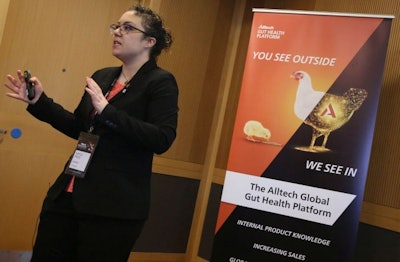
The importance of trace mineral form on bird performance and eggshell quality was a key discussion point at the Alltech European Technical Summit.
While the role of trace minerals, such as copper (Cu), iron (Fe), manganese (Mn), zinc (Zn) and selenium (Se), in positively improving bird health and performance is largely understood, the form in which they are supplied makes a big difference.
At the conference, Dr. Kayla Price, Alltech Canada’s poultry technical and research manager, explained why organic mineral sources deliver a number of valuable benefits compared to their inorganic counterparts, including improved eggshell quality.
“Organic minerals in a chelated form, such as those manufactured by Alltech, closely resemble minerals found in nature and therefore have better bioavailability, stability and movement across the gut compared to inorganic minerals,” she said.
“This results in increased uptake and absorption, allowing birds to utilize the minerals more efficiently, which supports bird health and the production of a high-quality product.”
These benefits were highlighted in a trial that specifically looked at eggshell quality. Two groups of birds were fed two diets: one containing inorganic minerals; and the other including the addition of Alltech’s chelated organic minerals. Eggshell strength was measured using an eggshell force reader from 20 weeks of age to 80 weeks of age.
The results showed that feeding Alltech organic minerals improved consistency in eggshell strength across the 60-week period, with a variance of 1.01 kilograms of force in eggshell strength, compared to 1.14 kilograms of force for birds fed inorganic minerals.
“The results also highlighted that when organic minerals are used, there is an increase in the uniformity of eggs and a decrease in the number of undergrades,” said Price.
Although mineral nutrition plays a vital role in improving eggshell quality, she reminded delegates at the summit that a multifaceted approach yields the best results.
“There’s a whole host of factors, including age, management, environment and genetics, that impact eggshell quality,” she said. “But, taking all possible steps to improve gut health is something I’d strongly recommend.
“The structure of the gut wall controls the absorption of vital nutrients, as well as balancing good microbes and potentially bad bacteria,” she continued. “Therefore, in order to successfully transform vital nutrients into performance and high-quality eggs, the gut needs to be working efficiently.”
















